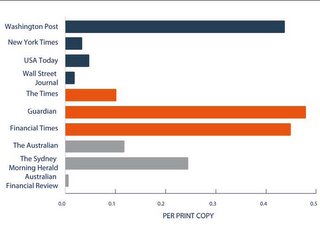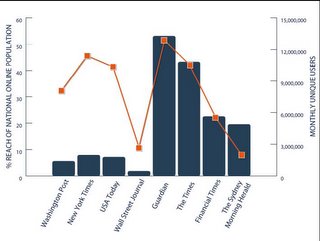
Thirty billion page views in one month by a newspaper owner is a number that
should bring every PR practitioner up short. How would anyone get that number of eyeballs on newspaper and magazine article and advertisements. Rupert Murdoch doesn't. The eyeball count he likes are in Internet media.
This media attracts the equivalent to one and a half times the membership of the CIPR clicking on a web page every second of every minute of every hour of every day. These are audience numbers that PR has to engage with. We have no choice. We have to use every method for communication available to reach these audiences.
Our competition is no longer an alternative agency.
David Siffrey shows one competitor. It is the 50 million bloggers. The audience, the public, the stakeholder is also the medium. Two new blogs are created every second. These are people like Rt. Hon. David Milliband, Sir Peter Stothard, Oliver King, Andrew Lloyd Webber and the President of the Chartered Institute of Public Relations. Some are not quite so erudite as others but together they are publishing 18 articles every second. Of course one in three of these articles are in Japanese and probably only one in 16 emanates from the Europe. So just short of 750 posts are made by Britsh bloggers every second. Its not that many really. Just 13 million articles a month.
Wait a minute..... It is more literature generated by our population that at any time in history. It is even more powerful than the penny post. It is a literature that, like these people taking part in the BBC programme is
engaging a generation. It is also a public literature.
If your profession is to engage with public literature. It would seem extra-ordinary not to engage with the most prolific of all literature in all time.
Of course this literature will change, it will morph, like all media and all literature before it, it will mature. That is no reason to ignore it.
This is why I have cross posted a comment on
Stuart Bruces' blog about the apparent view of the principle advisor to the Chartered Institute of Public Relations.
I have thought hard about whether to comment on this issue.
I have commented in the past. Stuart shows who else has engaged in this conversation including
Richard Bailey who is a long time observer of public relations education. It does matter to our industry and especially the members of the Institute.
It matters at a number of levels.
The evidence that there are new channels for communication are all round us. Take any train journey and count the number of iPods in use and one gets the idea. Not all are used for music. One may also see evidence of people creating and responding to text messages frantically writing text into their cell phones. In Starbucks round the world people work on laptops using wireless connection to the Internet. The most insular of people must surely see these things round them and a moment's thought shows that these are channels for communication.
But are they legitimate channels for Public Relations communication?
Well, in part, yes. The are the means by which a press releases can be distributed, for example, by email. Cell phones are good for arranging meetings and events. The Web is useful for the delivery of lists of people such as journalists.
But this is not using new media in the practice of PR it is using the Internet to facilitate PR activities.
Detailed, independent, and empirical analysis of
the job descriptions of people who work in public relations (PDF) and join PR associations shows that the industry predominantly attracts people whose main work (in the UK at least) is press relations and event organisation.
The New Media involvement of people at home and at work with forms of communication such as
Instant Messenger combined with conference and video telephony, Interactive web sites such as blogs, collaborative
project management, co-created knowledge bases like, for example,
this new PR Bibliography (a wiki), and completely different
commercial Second Life like environments, some with very
business oriented applications, is a different form of communication and relationship building.
On the fringe of both these forms of communication and engagement (on/offline) are people who have an interest in reputation management, corporate and product brand promotion, investor relations and influence among communities who affect organisational behaviours. These people form a third phalanx of practitioner with interests that are not mainstream to either the traditional party organiser/press officer or New Media relations practitioner.
- That there are people who earn a living from each of these areas of activity is not in dispute.
- That there are companies that invest heavily in these areas of activity a matter of public record.
- That there are communities of practitioners, to a greater or lesser extent, associated with these activities such as the Chartered Institute of Public Relations (CIPR), PRCA IABC PRSA is evident.
What is important is the relevance of these associations to the three areas of practice outlined above.
I am saddened that the CIPR's principle advisor is not very serious about committing to New Media practice and practitioners.
The latest comment uses a privileged
position in the Institute, is retrograde and flies in the face of the CIPR's own Internet Commission findings (I was its chairman) in 2000/1. Perhaps it is now time for the Institute to publish those papers for all the members, and not just a select few to see the papers that were presented.
The CIPR's spokesman, prescient in so many other ways, seems to dismiss an area of practice that is growing by being critical of a form of Internet Mediated communication, namely blogs.
His comment in Profile Magazine: "
If there are any good blogs still around in six months I'll come back to it," may not be directly aimed at blogging
literati and Knights of the Realm ,
senior political commentators or
Ministers of the Crown but are, this time, all-inclusive. As, in his own words the principle advisor to the Institute'e Council (For Imediate Release show 160) seems to be that my organisation (the CIPR) is under no pressure to consider, let alone act on, the significance of New Media in the interests of its members.
This view runs contrary to informed opinion among the world's most involved commentators such as WPP's Sir Martin Sorrell (owners of Hill & Knowlton and GCI among other PR firms). In a CNN interview last week, Sir Martin said: "
One of the interesting things is that the new technologies, the blogs, the development of Web sites, the development of social networking sites, is really I think probably giving a new driver to public relations and public affairs. Paid-for publicity, it is known from research, is probably less effective than editorial publicity".
Sir Martin makes it apparent that this is an area of development for the most powerful PR agencies in the world and, at the same time makes the connection between New Media and the third phalanx of practice.
It would also appear Edelman's David Brain, who commented last week that Public Relations practitioners are the 'natural inhabitants of this (Social Media) world' is of a like mind. There is agreement that development of skills, models of best practice and working in New Media, is an opportunity for PR practitioners.
The critical issues for Edelman, H&K and GCI and many, if not most other, PR consultants and in-house practitioners are:
- Who will represent the interests of practitioners involved in New Media;
- Who will ensure the training, education and mentoring is available;
- Who, will take up the sector wide mantle of representations with officialdom as this area of work evolves to the majority of members both in-house and in smaller agencies and
- Where is the imprimatur for proposing planned, managed and properly evaluated New Media programmes?
....
The timing of the CIPR statement was not good. Within 48 hours the
Economist in an article headlined '
Who Killed the Newspaper', suggests that current media relations practice (the rock and foundation of CIPR member numbers) will have to change. It is not the first publication to identify the online threat to newspaper survival and journalists in-post.
Are PR practitioner members to die with the print media? Is there nothing the CIPR can do for them - such as retraining for the New Media. The present stance seems not to serve even the core membership well.
Critical comments from a leading official of an influential PR association (even if research of its membership demonstrates a focus that leans towards relationships with print journalists and party planning) are not helpful to those who make a living advising organisations about managing their social media presence (including Edelman, Hill & Knowlton and GCI,). This is especially true when many of these agencies boast significant membership of the CIPR and other like associations world-wide. Such criticism has, to an outsider and however misleadingly, the ring turf wars, splits and division.
The CIPR seems to be selectively representing its members but not the practices of public relations identified by Sir Martin or David Brian.
Colin Farrinton's exposure to a Public Relations audience in numbers well in excess of any CIPR conference platform in an interview in
For Immediate Release (a New Media public relations specific podcast), experience of the
President's blog and a scan the Institue's own Commission papers would at least have shown that there is a place for members who are active in the New Media.
...
This most recent statement, to return to the blogging issue in six months, indicates that client investment to engage a community of people who comment about client brands, products and behaviours can wait for six months or so before further guidance is available.
Indeed, it would seem an even later date because that is as soon the Institute will vest time considering the significance of this New Media for members.
Meantime:
- Member can see comments online about their clients companies and professional practice but have no professional guidelines.
- There is discrimination between New Media member practitioners and other members.
- It even has policies.
- The Institute is willing to accept freely donated articles in its magazines and training in this area during such a New Media moratorium.
- Its regional organisations are running well attended New Media events.
- The Institute is even charging members money to attend these activities.
- There is a miss-match in the education programme.
The CIPR New Media strategy, to a casual observer would seem to be dysfunctional. A dichotomy, or worse?
Who distinguishes the private comments of John Presott and Governement policy or the comments of Colin Farrington and The Chartered Institute or PR practice in general.
This apparent public voice of Public Relations in the UK, (the CIPR)
- Suggests that practitioners working in New Media are less than welcome into the fold because they are:
- At best, too far ahead/different to mainstream practice (press release writing, pitching and party planning and something called 'spin')
- At worst, engaging with people (that is, bloggers like the Rt. Hon. David Milliband, Sir Peter Stothard and Oliver King) who fall outside some, as yet, ill defined but hoped for blogging elite.
- Already has (a) blogging policies:
- a policy against bloggers astroturfing (but does it have a credible capability to campaign, advise members or even align itself with the real, global, campaigners who are working in this area?), which suggests a deep understanding of the blogersphere.
- Wants to profit from New Media:
- Does not have a publication, white paper or guidance note about New Media. Its five year old Commission Report is out of print and its text books do not even mention Technorati or Google Blog Search.
- Is able to accept voluntary contribution (e.g. articles in magazines, books) to generate wealth on its expertise (?) in New Media (Profile cover price is £4.75)
- Takes money from members and non-members attending events associated with New Media.
- Seeks educational organisations to prepare and educate young people for the industry
- Is prepared to engage trainers who have no experience of social media to teach it
- Is prepared to teach new media techniques without a prior foundation in new media context, strategy, planning, monitoring or evaluation
- Endorses F/E courses that do not include New Media modules by default
- Provides no franchise to F/E establishments to examine the social and economic consequence deriving from the semantic Web as it affects the practice of PR.
I start writing the the second edition of the CIPR's book on Internet mediated PR this week. It shows that there is a commitment in this area.
I begin teaching New Media courses at first degree and Masters level in a month's time which shows there is commitment among CIPR recommended FE establishments.
The regional branches are, evident in the course I ran for the west of England last Thusrsday, running new media courses. With people like
Juliet making their first ever blog posts.
This is evidence of an underlying groundswell of interest, support and commitment to New Media and that is important.
However, it shows there is inconsistency and that is not helpful.
Picture:
Rupert Murdoch


















